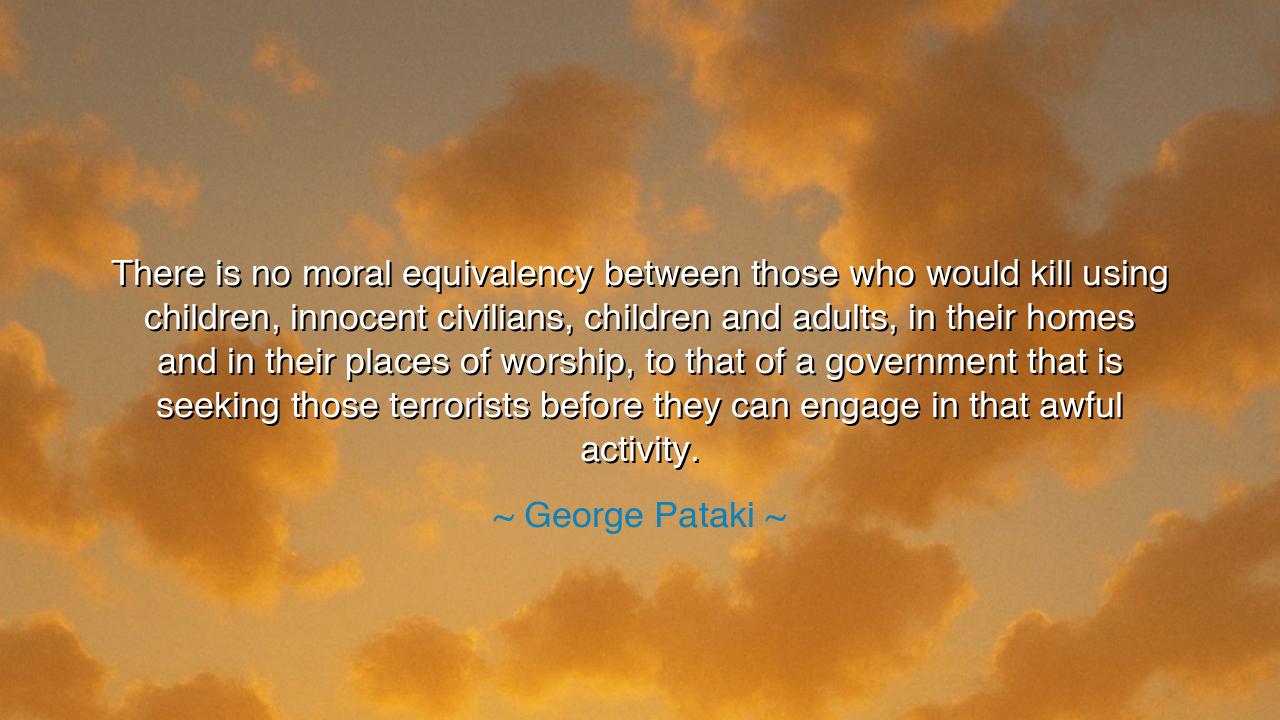
There is no moral equivalency between those who would kill using
There is no moral equivalency between those who would kill using children, innocent civilians, children and adults, in their homes and in their places of worship, to that of a government that is seeking those terrorists before they can engage in that awful activity.






Hearken, children of courage and seekers of justice, and attend to the words of George Pataki, who proclaimed with solemn clarity: "There is no moral equivalency between those who would kill using children, innocent civilians, children and adults, in their homes and in their places of worship, to that of a government that is seeking those terrorists before they can engage in that awful activity." In these words lies a profound reflection on morality, duty, and the sacred role of governance in the defense of life. Pataki reminds us that justice is not blind to context: the actions of defenders and protectors cannot be equated with the deeds of those who spread terror and destruction.
The origin of Pataki’s insight rests in the grim realities of modern conflict and the rise of terrorism, where violence is indiscriminate and targets the innocent to sow fear. Governments, by contrast, wield power not to harm, but to prevent harm, to anticipate the machinations of malice, and to shield the defenseless. In this, Pataki emphasizes that intent, purpose, and moral orientation distinguish acts of defense from acts of atrocity, establishing a moral hierarchy between protectors and aggressors.
Consider the imagery of innocence violated. To use children and civilians as instruments of terror is an act so vile that it stains the soul of those who commit it. Pataki’s contrast underscores that governments, in pursuing justice and security, act to prevent such violations, not to perpetrate them. To defend, to preempt, and to restrain malefactors is an act of moral responsibility, rooted in the preservation of life and the sanctity of human dignity.
History provides vivid exemplars. During World War II, Allied forces pursued Nazi leadership to prevent further atrocities against civilians, Jews, and children. While war inevitably involved violence, the moral aim of these actions was to protect the innocent and defeat those committing systematic murder, rather than to inflict harm indiscriminately. Pataki’s reflection echoes this principle: the justice of defense is inseparable from the intent to protect, distinguishable from the indiscriminate evil of terrorism.
Pataki’s statement also illuminates the ethical dimensions of governance. Leaders must wield power judiciously, aligning force with principle, and ensuring that action is always directed toward the protection of life rather than its destruction. Moral clarity requires distinguishing between aggressors who exploit innocence and the lawful guardians who seek to preserve it. This distinction underpins the legitimacy of authority and the moral compass of the state.
The lesson is timeless: defense undertaken for protection is morally distinct from acts of terror, and the preservation of life demands discernment, courage, and preemptive vigilance. Citizens and leaders alike must recognize that morality is not measured merely by the presence of force, but by the intent, context, and protection it serves. Pataki reminds us that justice demands both action and conscience, and that true courage lies in defending the vulnerable.
Practical actions follow naturally: support policies and institutions dedicated to the prevention of violence; understand the ethical responsibilities of governments in protecting citizens; advocate for measures that safeguard life while upholding justice and legality; and cultivate personal discernment in evaluating moral claims, recognizing the difference between acts of terror and acts of defense. By doing so, one honors the sacred duty to preserve life and uphold justice.
In sum, Pataki’s words illuminate a profound truth: the moral weight of action lies in intent and context, and there is no equivalency between those who terrorize the innocent and those who act to prevent such atrocities. Let this wisdom guide both citizens and leaders, ensuring that courage, justice, and protection remain the guiding principles of governance, and that the innocent are shielded from the ravages of violence.
If you wish, I can craft an even more epic, mythic version, turning Pataki’s reflection into a heroic narrative of moral clarity, defense, and the eternal struggle to protect the innocent—perfect for immersive audio storytelling. Do you want me to do that?






AAdministratorAdministrator
Welcome, honored guests. Please leave a comment, we will respond soon